
–
ROLAND GARROS – Victoria Mboko doesn’t turn 19 until the second day of this year’s US Open. And yet, it feels as though Sunday’s Grand Slam main-draw debut was a long time coming.
As she celebrates her birthday, it’s entirely likely she’ll be straight into the main draw at Flushing Meadows and preparing for, or playing, her first-round match.
But in the meantime, the Burlington, Ont. native is having to grind her way through the qualifying. And the way she rolled through three victories at Roland Garros this week without dropping a set, you have to think those days are numbered.
In her Grand Slam main-draw debut, Mboko will face Lulu Sun, a 24-year-old Swiss-Kiwi lefthander who’s currently ranked No. 45.
A quick adjustment from Parma
Mboko had to make a quick pivot from the WTA 125 in Parma, Italy, where she beat three top-100 players on the way to the final. There, she was beaten by Mayar Sherif.
Maybe it was a good thing not to have much time to think about it. Mboko had been to Roland Garros once, in 2022, when she was just 15 and lost in the third round of the juniors girls’ event.
But it’s a big moment in her career. And she admits to having some nerves before her first-round match against the very capable Austrian, Sinja Kraus.
An hour and 19 minutes later, she was a 6-4, 6-2 victor.
Here’s what it looked like.
“I was coming from Italy so quick and so fast so in the first two games of course I was really nervous. It’s my first Grand Slam appearance, and she’s a very good player. So it took me some time to adjust to the courts and the environment,” said Mboko, who rated herself a B+ on the day. “I adjusted pretty well and I kind of got back into the game, and got back in my composure, so I I’m pretty happy with the way I played today.”
2nd round: Kathinka Von Deichmann
Next up was Kathinka Von Deichmann, a 31-year-old – a rare player from Liechenstein – who’s ranked near her career best at No. 161 and had destroyed Mboko’s countrywoman Rebecca Marino in the first round.
But the steady diet of backhand slices that undid the very tall Marino didn’t have the same effect on Mboko, who dismissed her 6-3, 6-2 in an hour and 17 minutes.
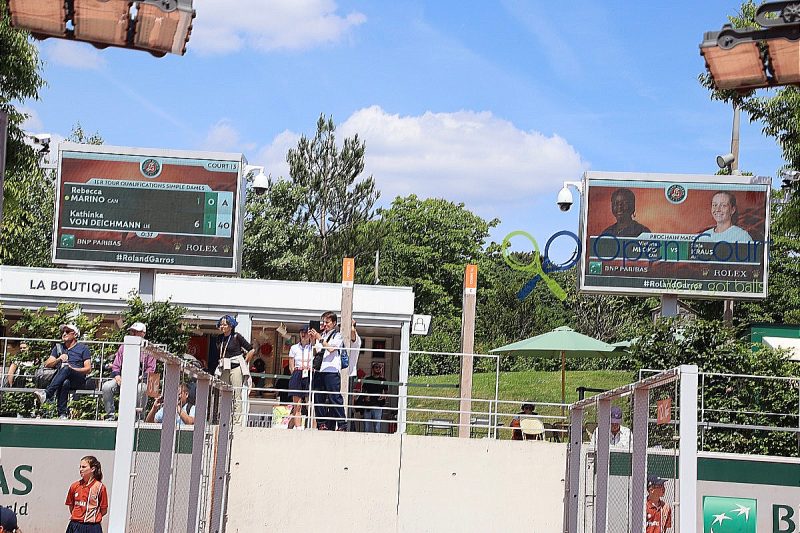
Mboko played Kraus on the adjacent court to the Marino – Von Deichmann match and was able to watch a little bit of it as she waited to get on her own court. But given all the butterflies it probably didn’t register too much.
Here’s what it looked like. Absolutely routine – but given the difference in rankings, probably not a huge surprise. Mboko wasn’t seeded in the qualifying because her results in Parma and Rome came too late for that; if it had, she’d have been in the top 20 seeds.
“She has a really good slice so I think I was expecting it a lot more and she was doing it a lot more often. So it was kind of easier to predict at some point in the match, and I kind of prepared me a lot earlier in the point to expect it,” Mboko said. “Today was a lot easier to get into it (than the first match), and I think I adapted pretty well anyway.”
Mboko had few expectations coming into the tournament – a normal attitude, when it’s your first time doing anything.
But after winning her first round, then her second, she couldn’t help but think of the end goal.

Final round: vs. Kaja Juvan
And in the final round, she faced the best player of the week in Slovenia’s Kaja Juvan.
Still only 24, Juvan was an Orange Bowl champion and a top-five player as a junior, was a top-60 player three years ago before she took a break from the sport. She was gone so long that the official photo on her WTA website page dates back to … 2019.
And she was in form. Two weeks ago, at a WTA 125 in Saint-Malo, the Slovene defeated Greet Minnen, Katie Volynets and Viktorija Golubic before going down to Naomi Osaka in the final.
But she played just one tournament from Oct. 23 to February of this year, where she started back at the ITF level. It wasn’t an injury as much as she decided she needed to step away for awhile.
She began beautifully, mixing up drop shots and moonballs with hard, flat groundstrokes. And she was up two breaks before Mboko started to figure it out.
In the end, it was a 7-5, 6-2 win that put her into a Grand Slam main draw for the first time in her young career.
“At some point in the match she kind of started to change up her game a little bit and started to throw me some some different shots that I wouldn’t normally expect. And it kind of threw me off of it mentally and physically,” Mboko said. “I mean she’s she’s a really great athlete, too. She was running down a lot of balls and bring back a lot of high, spinny balls to me. I was kind of frustrated with a little bit but I kind of had to adapt myself and get into some kind of focus.”
Mboko tried to trick her brain into thinking it was just another match – just some random second-rounder at a $15K ITF somewhere. That would have taken some doing, given the venue.
“I would’ve never thought I was going to even be playing a major at the beginning of the year when my ranking was around 300,” she said. “I was like, ‘Okay, you’re in the final round of qualies now, so you know you’re so close – yet so far.’ Even before the match I was like, ‘You know what? Just take it as another match. Don’t think about the Grand Slam thing. Whatever happens, happens.’ But just give it all all you have and whatever’s thrown at you, just adapt.”
The road to success is pain-free
The biggest takeaway from Mboko’s junior career – which was a good one, and included semifinals in singles at Wimbledon and the US Open, and doubles finals at the Australian Open and Wimbledon with Kayla Cross in 2022 – is the pain.
There wasn’t a moment where Mboko didn’t have all sorts of knee wraps, among other body parts.
She told Open Court this week that the knee basically hurt all the time.
Here are a few shots of her junior self.
At the Australian Open, where she and Kayla Cross made the doubles final.
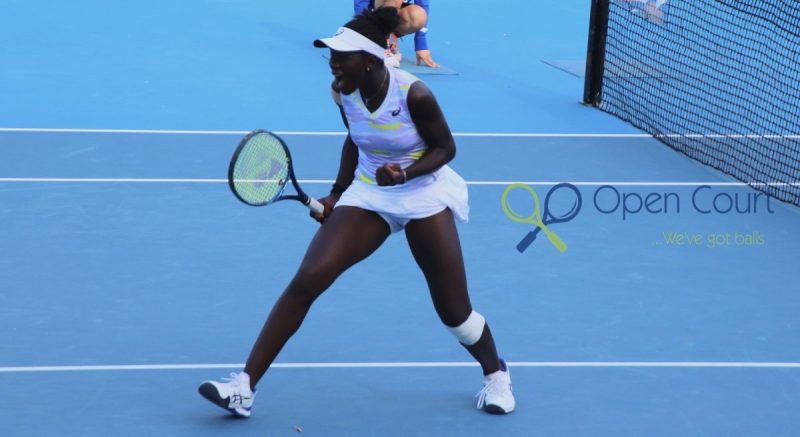
At Roland Garros in 2022.
At Wimbledon – all wrapped up.
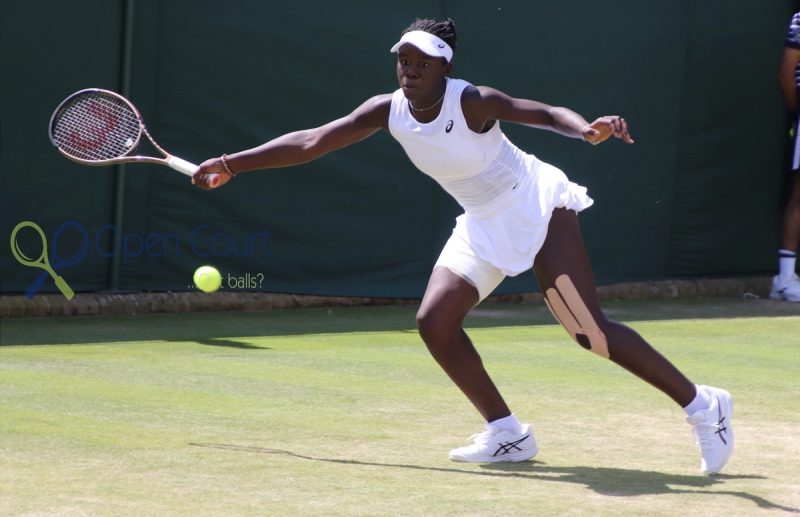
At the US Open, where she lost to Alexandra Eala in the semifinals.
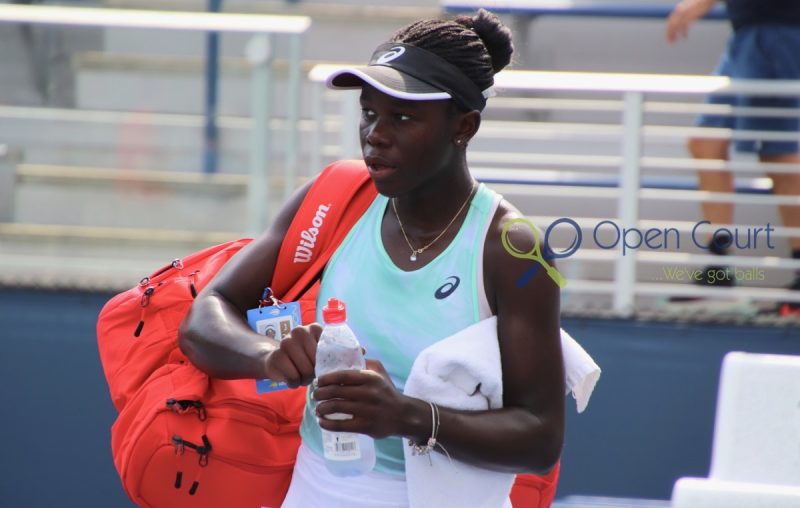
It’s been a ride through the academies as well.
Mboko was down at the IMG (Bollettieri) Academy in Bradenton, Fla. at a very young age. But then the pandemic hit (she was 13 at the time). And they closed up shop for awhile.
And so she came home.
Tennis Canada backed her for a number of years, even through all of the knee pain they couldn’t find a diagnosis for. She was also growing through those years, which didn’t help.
For about a six-month period, she sort of fell off the radar completely. And the next time she surfaced, she was at the Henin Academy in Belgium.
From what we understand, it was a Belgian doctor who was able to find the source of the knee issue. It wasn’t a problem with the knee, but a major imbalance in the difference in strength between her two hips, with the left hip being significantly weaker. No one is perfectly symmetrical – especially right-dominant tennis players. But there was a difference significant enough that the body overcompensated.
Lonesome for home, Mboko returned and came back under Tennis Canada’s wing.
She had had coach Nathalie Tauziat travelling with her a fair bit, although Tauziat is not a full-time Tennis Canada coach, so occasionally other coaches travel.
The secret to her success
Why is she winning? Mboko is now 40-5 on the season at various levels, including impressive debuts in Miami and then in Rome, where she took Coco Gauff to three sets.
“I think in the matches I’ve kind of noticed that I’ve been overly positive with myself on the court, because that’s what helps you bounce back on the points – like I don’t wanna dwell on my losses and stuff. I feel like I’ve been trying to pump myself a lot more – way more than I used to,” Mboko said.
“And of course I’ve been injury-free so that helps a lot. I’ve been feeling so confident with my body and with no knee pain it’s been great so far.”
Mboko said she’s added injury prevention to her routine every single day, taking it a lot more seriously than she did as a junior. And doing a lot more treatment and rehab to protect her joints.
She doesn’t look a whole lot different than she did as a 15-year-old junior. But she is taller; she says she’s “almost 5-10 – at the upper range of the 5-9s”.
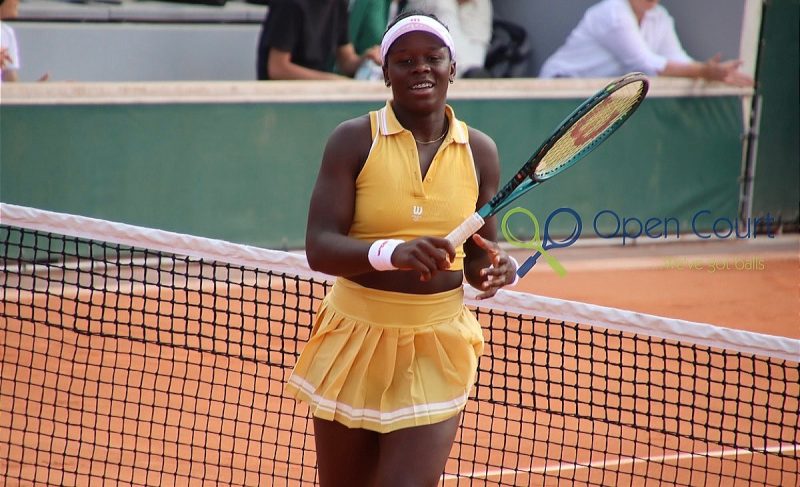
And, of course, a lot more powerful.
We’ll see on Sunday what she can do against Sun, whose breakout moment was last year at Wimbledon.
There, she went from the qualifying to the quarterfinals – upsetting Zheng Qinwen in the first round and Emma Raducanu in the fourth round before falling to Donna Vekic. Of thee eight matches Sun played, five went the distance.
But Sun struggled after that, mostly due to illness and also the toll of playing eight high-pressure matches in that condensed time period.
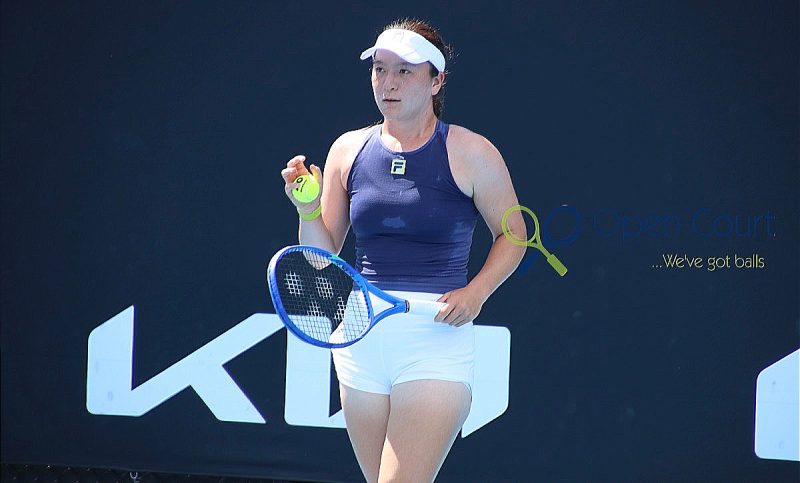
She also made the final of the WTA 500 in Monterrey, the week before the US Open. A Saturday night final in Monterrey and a long flight to New York that arrived on Sunday – and a first-round match on Monday. And that was it. For awhile.
She lost six straight first round matches through the end of 2024 and the start of 2025 – and pulled out of two other big tournaments – before beating Caroline Garcia in the first round in Abu Dhabi in February. Then came three more first-round losses before she won two matches at Indian Wells.
Sun worked for several years with veteran coach Vladimir Platenik before that ended abruptly earlier this year.
She’s been working with a new coach since Indian Wells – Frenchman Dorian Descloix.

More Stories
ATP Rankings Report – As of Oct. 20, 2025
WTA Rankings Report – As of Oct. 20, 2025
What a week for the Canuckians